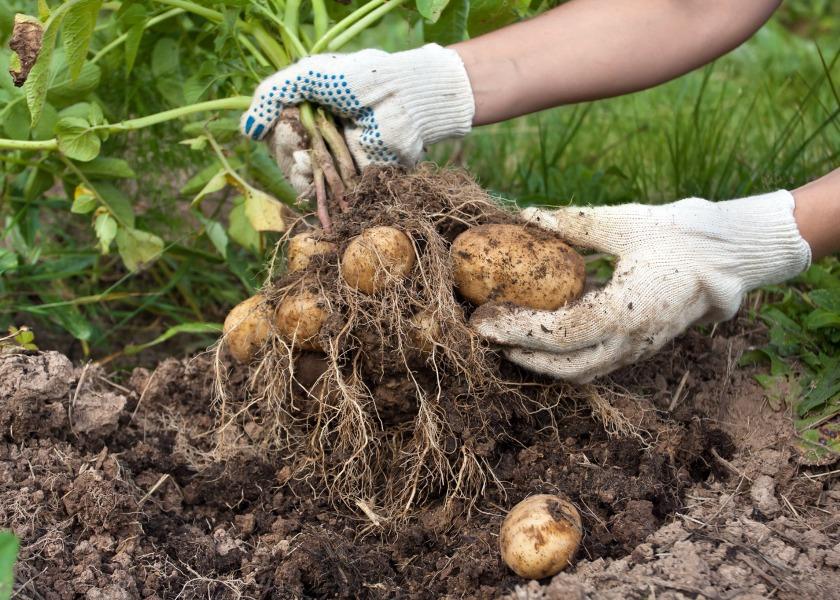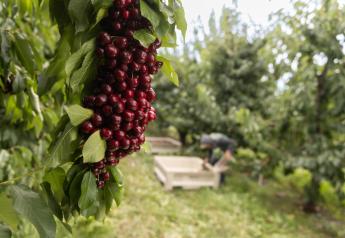Researchers seek new strategies to combat yield-reducing potato disease

Michigan State University researchers are leading a grant-funded project to combat a disease capable of devastating potato crops.
The research team has received a $750,000 grant from the USDA’s National Institute of Food and Agriculture to develop and evaluate sustainable methods of managing potato early die complex, which can reduce potato yields by as much as 50%, according to a news release.
That's particularly significant to Michigan, which ranks eighth nationally in potato production with more than 46,000 acres and 1.7 billion pounds harvested each year. The industry contributes $1.24 billion to the state’s economy, according to the Michigan Potato Industry Commission, and the state is also the nation’s leader in producing potatoes for use in chips.
Potato early die complex is caused by the convergence of a fungus, Verticillium dahliae, and a nematode, Pratylenchus penetrans, which compromises the plant’s health before it’s able to reach maturity. Previous research on the disease has shown that other pathogens may influence it as well.
Related news: Progressive Produce anticipates good quality in California potato crop
The new project will be led by Marisol Quintanilla, a nematologist and assistant professor in the MSU Department of Entomology.
Seeking effective treatments for potato early die disease
In a recent survey of Michigan potato growers conducted by Jaime Willbur, an assistant professor in the MSU Department of Plant, Soil and Microbial Sciences, 45% said potato early die complex was one of the top three disease concerns, while 42% stated that current management strategies need to be improved, according to the release.
The most common current treatment is fumigation, which has negative effects on the soil microbiome and can reduce the efficacy of biological controls. Quintanilla believes these biological controls may hold the key to better management.
“Our previous research has concluded that poultry manure and a compost blend are effective at reducing P. penetrans populations and improving potato yield,” Quintanilla said in the release. “The pesticidal effect of these products is not fully understood, but literature suggests that it is attributed to a combination of mechanisms, including the activity of microbial communities that reside in these amendments.”
While soil amendments have typically been used to improve soil health, structure and quality, there is increasing focus on the potential to fight disease. The goal of the new project is to provide insights on a compost blend that has the desired antimicrobial characteristics to fend off potato early die complex.
According to the release, researchers will work to accomplish this through three objectives:
-
Quantify and identify microorganisms derived from manure-based amendments that are playing an important role in P. penetrans suppression.
-
Determine the impact and response of the biological activity of manure-based amendments on commercial potato fields and the suppression of the potato early die disease complex.
-
Collaborate with both in- and out-of-state extension educators to disseminate materials for growers.
Research will take place in the field and the laboratory. Two experiments will be hosted at a farm in southwest Michigan with a history of potato early die complex; these will be replicated in North Dakota. Extension materials will be created for use online and in print, including a potato management handbook.
“Growers will be heavily involved in the process because this research is really geared toward meeting their needs,” Quintanilla said in the release. “We want to make sure the resources we generate are accessible to as many growers as possible.”
Other MSU scientists involved include:
-
Luisa Parrado, a doctoral student in Quintanilla’s laboratory who helped author the project proposal.
-
Henry Chung, an assistant professor in the Department of Entomology.
-
Jennifer Pechal, an assistant professor in the Department of Entomology.
-
Chris Long, a potato extension specialist in the Department of Plant, Soil and Microbial Sciences.
Guiping Yan, an associate professor from North Dakota State University, will also contribute to the research, according to the release.







